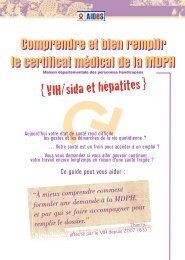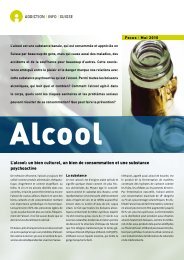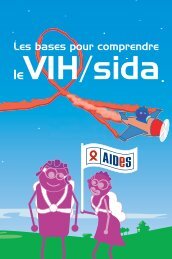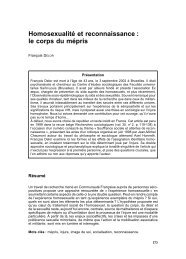Care and support for people living with HIV/AIDS
Care and support for people living with HIV/AIDS
Care and support for people living with HIV/AIDS
You also want an ePaper? Increase the reach of your titles
YUMPU automatically turns print PDFs into web optimized ePapers that Google loves.
Report on the global <strong>HIV</strong>/<strong>AIDS</strong> epidemic – June 2000Drug Access Initiative more relevant to clients who cannot af<strong>for</strong>d antiretroviral drugs,<strong>and</strong> to follow-up centres where antiretrovirals are not prescribed.Ef<strong>for</strong>ts to increase drug af<strong>for</strong>dabilityDrug price negotiations led to a significant decrease in the price of antiretroviraldrugs in the region, both <strong>with</strong>in the Drug Access Initiative <strong>and</strong> beyond. However, acomparison of these prices <strong>with</strong> those obtained by Brazil or Thail<strong>and</strong> (see Table 2)makes it clear that further price reductions should be possible to achieve, if need bethrough the introduction of generic competition.Ug<strong>and</strong>a, a relatively poor country, opted not to use any public funds to subsidizeantiretrovirals supplied through the initiative (the cost being borne by the patients). InCôte d’Ivoire, a richer country, the Government committed itself to shoulder part ofthe cost <strong>for</strong> selected patients; however, the allocation of treatment subsidies wasvery slow. While an in-depth analysis of the use of antiretrovirals outside the initiativewas not conducted, the fact remains that the programme in Côte d’Ivoire attractedfewer clients than that in Ug<strong>and</strong>a.Strengthening the health sectorThe educational ef<strong>for</strong>ts of the initiative were assessed as positive in both countries.In Ug<strong>and</strong>a, laboratory follow-up was strengthened by the donation of CD4 countingequipment. The growing interest of the countries’ advisory boards in opportunisticdisease management has resulted in more operational follow-up centres.Three challenges to be met in the months ahead are: integrating the advisory boards’guidance on <strong>HIV</strong> management into national treatment guidelines; regulating antiretrovirals<strong>and</strong> advanced drugs <strong>for</strong> the treatment of opportunistic infections as partof the countries’ national drug management policy; <strong>and</strong> preparing to make the initiativesustainable after UN<strong>AIDS</strong> reduces its subsidy.Societal impactIn both countries, the presence of the initiative galvanized <strong>people</strong> <strong>with</strong> <strong>HIV</strong> <strong>and</strong> <strong>AIDS</strong>by holding out some hope <strong>for</strong> them, <strong>and</strong> led to a wide mobilization of health sectorstaff around <strong>HIV</strong> <strong>and</strong> <strong>AIDS</strong>. It also resulted in a great deal of discussion of <strong>AIDS</strong> inthe media – not only about the cost of <strong>HIV</strong> treatment but also <strong>HIV</strong> prevention. By raisingthe visibility of the epidemic, this level of discussion may enhance preventionef<strong>for</strong>ts <strong>and</strong> yield significant benefits that extend beyond the clients <strong>and</strong> health careproviders of the initiative.104











